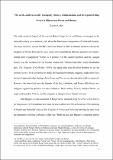Files in this item
'The earth...shall eat us all' : exemplary history, post-humanism, and the legend of King Ferrex in Elizabethan poetry and drama
Item metadata
| dc.contributor.author | Archer, Harriet | |
| dc.date.accessioned | 2021-09-11T23:37:36Z | |
| dc.date.available | 2021-09-11T23:37:36Z | |
| dc.date.issued | 2019 | |
| dc.identifier | 255782123 | |
| dc.identifier | 835a3def-833d-4470-8e52-64c787fb627c | |
| dc.identifier | 85069765649 | |
| dc.identifier | 000475873000006 | |
| dc.identifier.citation | Archer , H 2019 , ' 'The earth...shall eat us all' : exemplary history, post-humanism, and the legend of King Ferrex in Elizabethan poetry and drama ' , English: The Journal of the English Association , vol. 68 , no. 261 , pp. 162–183 . https://doi.org/10.1093/english/efz024 | en |
| dc.identifier.issn | 0013-8215 | |
| dc.identifier.other | ORCID: /0000-0002-5544-582X/work/61133235 | |
| dc.identifier.uri | https://hdl.handle.net/10023/23951 | |
| dc.description.abstract | The legend of King Ferrex was employed by Thomas Norton and Thomas Sackville in their succession play, Gorboduc (first performed 1561), and by John Higgins in his Mirror for Magistrates (1574; 1587), to reflect on contemporary politics and offer topical warnings to Elizabeth I and her subjects based on legendary British history. However, as well as including a section specifically focused on environmental exploitation, Higgins imbues the earth with a destructive animism in his poem which stands apart as an anomaly in his collection of verse complaints and amongst wider treatments of the story. Higgins’s emphasis on the arbitrary amoral and areligious destruction of all by the agency of the earth and other non-human actors challenges the Mirror’s educative model, and renders the Gorboduc legend inert. Looking at various versions of the narrative in Gorboduc, Higgins’s Mirror, and William Warner’s Albion’s England (1586), and analogous uses of environmental discourse in other contemporary poetic and dramatic texts by Shakespeare, Spenser, and Marlowe, this article considers the role of the nonhuman, and specifically the earth itself, in early modern imaginative historiography and political commentary. In particular, it suggests that there are fruitful connections to be made between modern posthumanist theoretical approaches, and the post-humanism of Higgins’s approach to exemplary history, whereby his admonitory text appears to abandon its premise of human primacy and perfectability in response to the perceived failure of Elizabethan advice literature to effect political change. | |
| dc.format.extent | 346118 | |
| dc.language.iso | eng | |
| dc.relation.ispartof | English: The Journal of the English Association | en |
| dc.subject | PR English literature | en |
| dc.subject | T-NDAS | en |
| dc.subject | BDC | en |
| dc.subject | R2C | en |
| dc.subject.lcc | PR | en |
| dc.title | 'The earth...shall eat us all' : exemplary history, post-humanism, and the legend of King Ferrex in Elizabethan poetry and drama | en |
| dc.type | Journal article | en |
| dc.contributor.institution | University of St Andrews. School of English | en |
| dc.identifier.doi | https://doi.org/10.1093/english/efz024 | |
| dc.description.status | Peer reviewed | en |
| dc.date.embargoedUntil | 2021-09-12 |
This item appears in the following Collection(s)
Items in the St Andrews Research Repository are protected by copyright, with all rights reserved, unless otherwise indicated.

